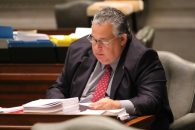JEFFERSON CITY, Mo. — Republican Sens. Paul Wieland and Bill White have been appointed to a task force established to improve access to greater and more affordable health insurance options in Missouri.
Wieland championed a bill through the General Assembly this year that would have created a similar task force — to create recommendations for a waiver altering certain provisions established by the Affordable Care Act — but it was ultimately vetoed by Gov. Mike Parson. In his veto letter, the Republican governor took issue with some of the deadlines for the task force SB 414 established.
However, Parson said he was supportive of the idea of the task force, and thus created one by executive order earlier this month.

The task force will research a certain waiver offered to states under the Affordable Care Act — under Section 1332 of the healthcare law — and make recommendations to the governor on the best way to apply and implement one.
Senate President Pro Tem Dave Schatz appointed both Wieland and White to the task force last week, noting both men have “decades of insurance industry and legal experience.”
“Addressing a decade of skyrocketing premiums and plummeting access to care will require the kind of thoughtful, focused work I’ve seen them both use in the Senate to find solutions to serious problems,” Schatz told The Missouri Times.
Only eight states have been approved for waivers and an additional six have waivers pending, according to data from the Kaiser Family Foundation, a healthcare-focused nonprofit. Wieland said the states that have been successful in obtaining waivers have seen a savings of up to 30 percent with premiums in the individual market.
“We’ve seen for years how the individual market has been really terrible for citizens,” Wieland told The Missouri Times, citing skyrocketing rates and dozens of counties with limited insurance options. “We’re in a crisis state.”
“We need to focus on trying to find innovative ways to bring insurance rates down, and we’re going to examine what other states have done. Some of what other states have done may not work in Missouri, but other stuff, we could steal their idea,” he said.

Despite his bill being vetoed, Wieland said he was encouraged by the creation of the task force after all.
“The fact that the governor, five days after he vetoed the bill, by executive order created this task force, tells you he understands the urgency and importance of it.”
Aside from the two senators, the task force will consist of the Department of Insurance, Financial Institutions and Professional Registration (DIFP) director or designee; two state representatives appointed by the House Speaker; a licenced health insurance producer; a consumer representative from the Missouri Foundation for Health and the Health Forward Foundation; a representative from Missouri’s hospitals; four licenced insurance company representatives; and anyone else selected by the governor.
The states that have already been granted a waiver are: Alaska in July 2017; Hawaii in December 2016; Maine in July 2018; Maryland in August 2018; Minnesota in September 2017; New Jersey in August 2018; Oregon in October 2017; and Wisconsin in July 2018. Most of the waivers are related to federal pass-through funding.
Colorado, Delaware, Idaho, Montana, North Dakota, and Rhode Island have waivers pending.
“What makes America great is we have 50 laboratories,” Wieland said. “Whenever the federal government tries to do a one-size-fits-all program, it’s usually a disaster. I’m looking forward to rolling up my sleeves and examining what these other states have done, take the best practices of what they’ve done and what we think will work here in Missouri, and shape that into something for the governor.”
Republican-led efforts to repeal and replace the Affordable Care Act — commonly referred to as ObamaCare — at the federal level have largely been unsuccessful. However, the Trump administration has attempted to rollback piecemeal some of its provisions.

Kaitlyn Schallhorn was the editor in chief of The Missouri Times from 2020-2022. She joined the newspaper in early 2019 after working as a reporter for Fox News in New York City.
Throughout her career, Kaitlyn has covered political campaigns across the U.S., including the 2016 presidential election, and humanitarian aid efforts in Africa and the Middle East.
She is a native of Missouri who studied journalism at Winthrop University in South Carolina. She is also an alumna of the National Journalism Center in Washington, D.C.
Contact Kaitlyn at kaitlyn@themissouritimes.com.














